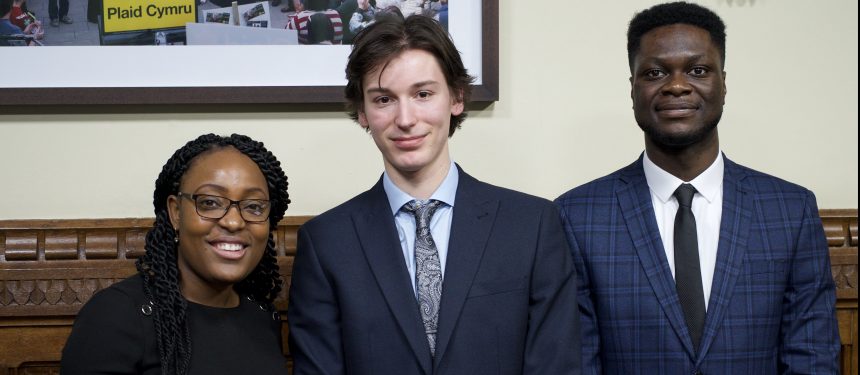A new parliamentary group has been launched to promote the UK’s continued participation in Erasmus+ and hold British prime minister Boris Johnson to account over his promise that there is “no threat” to the scheme.
News and business analysis for Professionals in International Education
Have some pie!
UK: New APPG will hold PM to account over Erasmus+ promise
 Left to right: Taiwo Owatemi with students Daniel Henshaw and Danny Schellhorn at the first meeting of the Erasmus+ APPG. Photo: The PIE News
Left to right: Taiwo Owatemi with students Daniel Henshaw and Danny Schellhorn at the first meeting of the Erasmus+ APPG. Photo: The PIE News Erasmus+ is the EU’s program to support education, training, youth and sport in Europe. Its budget of €14.7 billion is set to provide opportunities for over four million Europeans to study, train, and gain experience abroad.
“I’m hoping that he is a man of his word”
The All-Party Parliamentary Group on Erasmus+ was started by a member of Parliament for Coventry North West, Taiwo Owatemi, after the government failed to provide formal reassurances that the UK will continue to participate in the scheme after leaving the EU.
Over the next year, the new APPG will seek to create an open dialogue between universities, EU institutions and the UK government to ensure that all the parties are speaking to each other.
It will also set up meetings with the minister of state for universities Michelle Donelan to establish a timeline for the government’s plan around Erasmus+.
During the APPG’s inaugural meeting, Owatemi spoke to MPs about the importance of Erasmus+ and how it helps improve social mobility.
“I look forward to working with you all to safeguard the scheme that does so much to expand young people’s horizons,” she said.
“After all, the scheme provides means-tested support to over 70,000 people at the UK’s universities every year.
“It’s not just for those at university but also for learners at colleges and in continued education. Fostering aspiration and opportunity amongst the next generation is something that we need to get behind,” Owatemi added.
The UK’s position on Erasmus+ is still uncertain- earlier this year the UK parliament voted against a clause which would have required the government to seek to negotiate continuing full membership of the scheme.
However, then minister for universities, science, research and innovation, Chris Skidmore, said that the vote did “not end or prevent the UK participating in [Erasmus+] after leaving the EU”.
Boris Johnson has verbally supported the UK’s continued participation in the scheme, although the government is yet to make any formal commitments.
Responding to a question about the future of the scheme from Scottish National Party MP, Douglas Champman, during prime minister’s questions, Johnson said “there is no threat to the Erasmus scheme”.
“We will continue to participate. UK students will continue to be able to enjoy the benefits of exchanges with our European friends and partners, just as they will continue to be able to come to this country,” the prime minister explained.
Owatemi told The PIE News that the new APPG will put pressure on the government to stick to this promise and that she is “planning to hold Boris to his words”.
“The prime minister said in January that he plans to continue with the Erasmus program so I’m hoping that he is a man of his word,” she said.
“If he isn’t, then I hope to ensure that he is held accountable for his decisions and the policies he makes for the country.”
The APPG’s inaugural meeting was attended by Deputy vice-chancellor international of Coventry University, David Pilsbury, and University of Warwick vice-chancellor, Stuart Croft.
Both spoke at the meeting about Erasmus+ and how important the scheme is for their institutions. Two students from Coventry University also spoke about their experiences of Erasmus+.
Pilsbury told The PIE that Coventry University has a long tradition of widened participation and social mobility.
“[Erasmus+] is transformative for young people, but it is particularly transformative for students from non-traditional backgrounds,” he said.
“We are very fortunate in Coventry that we are disproportionately over-represented from students from non-traditional backgrounds because we put a lot of effort into promoting these opportunities- mobility in general and Erasmus in particular,” he added.
“We see the evidence day in, day out. It is the best investment a university or a government can make in its young people.”
Croft explained that while the UK has left the EU, it will continue to trade with Europe, just as it will trade with China and other countries around the world.
“If we don’t have these networks that are in place in Europe, we’re going to have to build them”
“What we all believe in, I think, is that these mobility options give people great opportunities to develop themselves and create really important links with companies for the future.
“That’s the case in Europe as well as anywhere else. So if we don’t have these networks that are in place in Europe, we’re going to have to build them.
“If we’re building them in Europe we’re not building further ones in China, or America… So let’s build on the platform we’ve got rather than taking away the platform that is already there.”
Still looking? Find by category:


